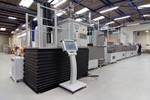Fibre Extrusion Technology contributes to sustainable composite solutions
FET’s range of laboratory and pilot melt spinning extrusion lines are suitable for process and end product development of sustainable materials.

This Sustainability Icon highlights FET’s commitment to sustainability through innovation and appears on all its promotional material. Photo Credit: Fibre Extrusion Technology
(FET, Leeds, U.K.) reports further contribution to the field of sustainable textiles and processes with its range of laboratory and pilot melt spinning extrusion lines which are said to be ideally suited for both process and end product development of sustainable materials. More than 50 of these pilot and laboratory extrusion lines are operating successfully in the field, and it currently has orders for 8 further systems, FET says. Further, the company is currently engaged at the development stage with other clients all seeking innovative solutions for sustainable projects.
FET further contends that it has considerable experience in sustainable fiber development across a broad spectrum of industries including medical, textiles, consumables, agriculture and composites. The company says it has successfully processed almost 30 different polymer types in multifilament, monofilament and non-woven formats. The in-house Process Development Laboratory also enables vital client testing and evaluation throughout the experimental and development phases of every project.
FET adds that it continues to widen its scope in this field, collaborating with companies worldwide in order to promote greater sustainability through innovative manufacturing processes.
Related Content
-
Trends fueling the composites recycling movement
Various recycling methods are being considered for composites, from novel dismantling and processing, to building capacity and demonstrating secondary use applications.
-
Corebon induction heating
This sidebar to CW’s August 2024 feature article reviews this technology for more efficient composites manufacturing and why it aligns with Koridion active core molding.
-
Plant tour: Hexagon Purus, Kassel, Germany
Fully automated, Industry 4.0 line for hydrogen pressure vessels advances efficiency and versatility in small footprint for next-gen, sustainable composites production.



